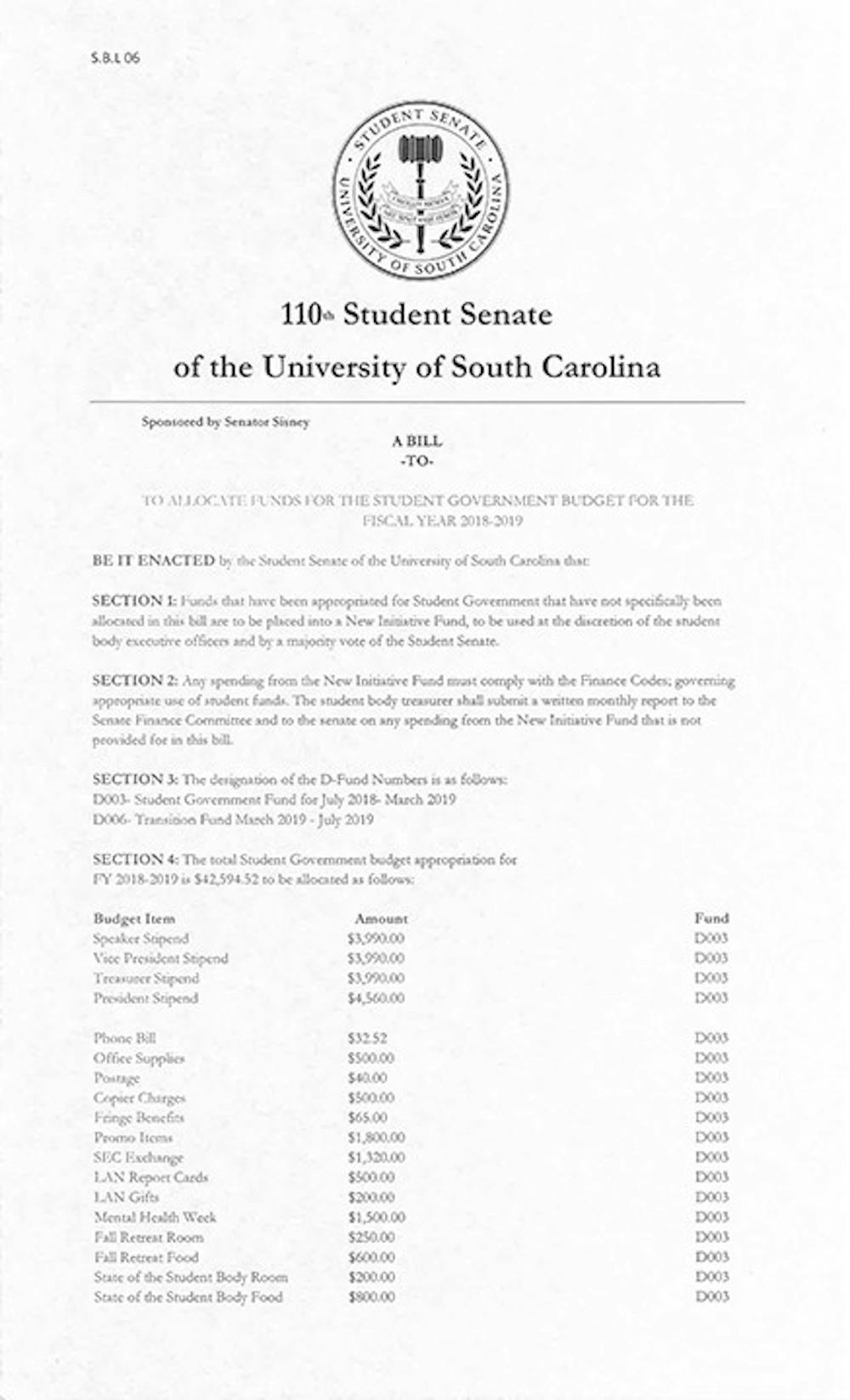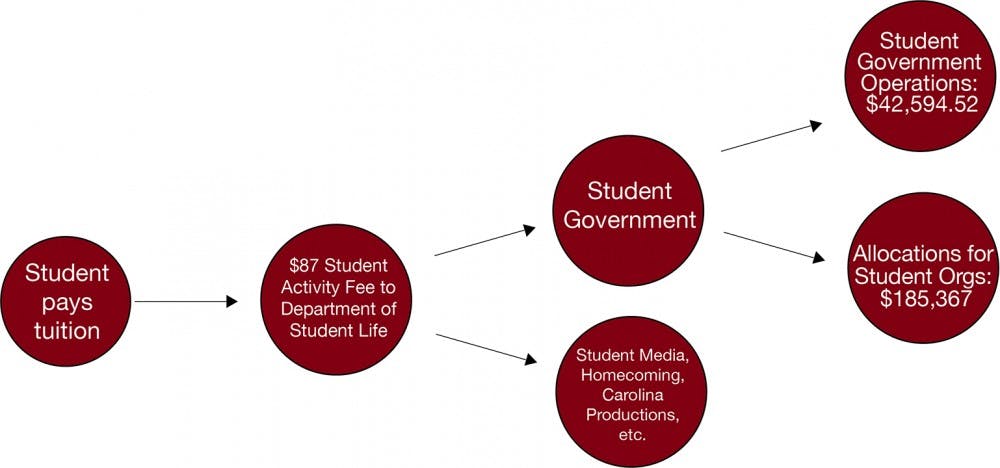

Student Government manages more than $220,000 of student money from the Student Activity Fee for allocation to other organizations and its own operation. However, the organization's records show that Student Government occasionally applies the allocation rules more generously to itself than other organizations.
Student Government leadership has rectified that discrepancy in some areas, but not in all.
For instance, this year’s Student Government operations budget included funding for monthly meeting food, T-shirts, office supplies, a trophy and other awards, office photos, frames for those photos, polo shirts and name plates — all things that Student Government codes state cannot be funded by Student Activity Fee money.
Some Student Government leaders explained the discrepancy, at least for meeting food, while others said the funding rules do not apply to Student Government the same way they do to other student organizations.
Monthly Meeting Food
The Student Government operations budget approved in the spring 2018 semester included $600 for monthly meeting food, an approval some said is against the organization’s own codes.
This is the first year Student Government has hosted monthly meetings for the full Student Government body, and Student Body President Taylor Wright said leaders thought it would be a good idea to have food available.
Section 3-6-70 of the Student Government Codes states that funds will not be allocated to student organizations to cover food for regularly scheduled meetings. However, the section of the budget itemizing funds for food for the Student Government monthly meetings passed the Senate Finance Committee’s review and was a part of the Senate’s approval.
Despite the approval, Wright acknowledged the breach of the organization’s codes and said the money designated for the food has been transferred to a budget line item called the New Initiative Fund. The New Initiative Fund is a portion of the budget set aside to facilitate any new programs Student Government develops after the budget is finalized.
“Upon further reflection, after the budget was already passed, we realized that that’s against the codes, so we have not used it,” Wright said. “The money will go towards the New Initiative Fund and that has to be approved by the Senate anytime anybody wants to pull out of that.”
Currently, there is no documentation on the budget indicating this transfer, as the Student Senate must approve any funding moved out of the New Initiative Fund. This fund is set aside for new Student Government initiatives, such as Coffee with the President on Greene Street.
“The goal of the New Initiative Fund is a funding category that supports bringing new initiatives into fruition for Student Government,” Student Body Treasure Emerson Odagis said in an email. “This money is spent with this vision in mind.”
Inventoriable Items
The Senate Finance Committee does not fund requests from student organizations requesting items that can be saved and used again, known as inventoriable items. For example, this year the committee denied a request from Active Minds to create a banner for tabling on Greene Street because it was deemed an inventoriable item.
Despite denying funding requests for inventoriable items for other student organizations, Student Government’s fiscal year budget outlines spending on inventoriable items for its own organization such as office supplies, trophies, office photos, SG executive polo shirts and name plates in both its operation and transition funds.
Student Government also approved $1,000 for T-shirts and $850 for the Student Government fall retreat, which was cancelled due to a hurricane. However, Odagis said those funds were also put toward the New Initiative Fund.
Funding Rules
Associate Vice President of Student Life Anna Edwards, who heads the department which provides funds to Student Government, emphasized the need for Student Government to follow its codes.
“That is ultimately their responsibility to see that they are spending according to their codes and that they are spending according to what has been approved through their process,” Edwards said. “It’s an incredible amount of responsibility that they hold. But they are ultimately responsible to their peers for how they spend their funds and how they represent all students and the programs and activities that they do.”
This fiscal year, Student Government is managing more than $220,000 from the Student Activity Fee for undergraduate student organizations. Of that total, $42,594.52 is earmarked for Student Government to spend on itself and on programs to benefit the student body.
So far this year, the Senate Finance Committee has received 85 requests for funding from student organizations on campus and has allocated $59,579.07 of the $185,367 budget as of Nov. 9.
While Wright said the money designated for monthly meeting food goes against the organization’s codes, Senate Financial Committee Chair Sam Sisney said the rules for funding Student Government operations differ from those that apply to other student organizations because they come from two different funds from the Department of Student Life.
“While Student Government is a student organization, it’s coming from a different set,” Sisney said. “So the money that was marked on the budget doesn’t have to fit these codes because it's coming from a different fund.”
Mohamed Soluiman, the assistant director of finance for the Department of Student Life and the adviser for the Senate Finance Committee, said the two funds were separate.
“That lump sum that we’re talking about for the finance committee is separate from their budget,” Soluiman said. “One portion of the budget is almost a departmental budget, functions like a department. And then whoever in charge of that kind of handles those payments, versus the student org's allocated funds. It’s a completely separate ballgame.”
Sisney emphasized the difference between spending money for Student Government and for student organizations.
“It’s a little bit different because it’s internal versus external," he said.
This fiscal year, $1,500 of the budget was set aside for Student Government’s annual formal event, and since then the budget for that event has risen to more than $3,500.
While there are issues with some of Student Government's internal allocations, other allocations made this semester have followed the same guidelines as those for other organizations.
For instance, the budget outlines money spent on attending different conferences in the SEC to work with student governments at other universities and trips to lobby in Washington, D.C. The Senate Finance Committee has allocated thousands of dollars to allow students from different organizations across campus to travel to conferences and tournaments.
Speaker of the Student Senate Patrick Ellis attended the SEC Exchange, where he met with other speakers of the senate from other SEC schools and discovered he was the only speaker elected by the student body.
“I loved it, for me specifically it was a really beneficial experience,” Ellis said.
Kyle Lang, a third-year business management student, is the treasurer of the Mock Trial Team and a member of the Senate Finance Committee. He said he has submitted eight allocation requests on behalf of the Mock Trial Team. The committee he sits on has allocated $4,320.54 to his organization — 7.2 percent of the total allocations so far. Lang recuses himself from the room during decisions involving the Mock Trial Team.
“The process, I think it’s pretty complicated, if you’re an outsider, if you’re someone who's just getting elected to your treasurer position,” Lang said. “There’s a very steep learning curve in my opinion ... but I get why they do it, why it's so difficult, because you have to have everything approved.”
Odagis emphasized the importance of communicating with Student Government for allocations to make the process easier in a town hall.
“One thing I will stress is that to make sure you have an open communication line with your student comptroller and they’ll help solve any issues,” Odagis said.
Editor's Note: This article was edited to clarify that Lang is not involved in Senate Finance Committee decisions involving the Mock Trial Team and reflect additional documents provided to The Daily Gamecock after publication regarding Mock Trial Team's allocations as of Nov. 9, 2018.

